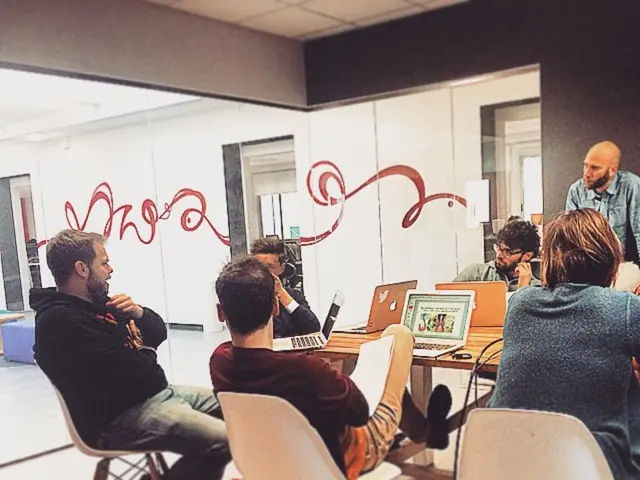The AI Revolution Hits White-Collar Jobs
AI Taking Over White-Collar Professions: Prosperity or Peril?
As AI keeps evolving, the world of corporate careers is facing a game-changing scenario. From finance to law to marketing, once-safe roles are getting streamlined – or obsolete. Here's a deep dive into the data, trends, and emotional impact powering the AI white-collar revolution.
AI: Transforming Your Workspace, Not Just Your Factory
Take a closer look, and you'll see AI isn't merely helping – it's redefining white-collar work. From legal professionals to financial gurus, front-line roles are now on the chopping block.
Why? Because today’s AI isn't just automating – it's replacing cognitive tasks. Writing reports, analyzing data, reviewing documents – you name it, AI can handle it. And it's happening now, not sometime in the future.
So, what does it mean to be a "safe" professional these days? The stakes have never been higher.
First to Go: The White-Collar Unemployment Line
Not all jobs will face the axe equally – but some industries are already feeling the heat of AI disruption. Jobs that rely on repeatable logic, data processing, and content creation are the most vulnerable.
Fastest-shrinking industries in the AI crossfire:- Finance: Goodbye, analysts – automated modeling tools are taking over.- Legal: Adiós, junior associates – AI contract review systems are on the rise.- Marketing: Bye-bye, copywriters and strategists – generative content tools are making their way in.- HR & Admin: Au revoir, routine tasks – intelligent automation has arrived.
AI isn't a passing phase – it's here to stay, and it's only getting faster.
The Unconventional Recession: AI Automates, Not Economies
This isn't your typical downturn. The White Collar Recession isn't driven by market crashes or shrinking profits. Instead, it's fueled by AI replacing people. Big firms are still growing, productivity is up – yet hiring in sectors like tech, finance, law, and consulting is grinding to a halt.
The cause? AI tools that can write reports, analyze data, and generate legal documents in seconds, at scale. This isn't temporary – it's structural.
The Human Cost of AI Advancements
"I was replaced by a tool I once helped implement." Not science fiction – that's reality for many white-collar professionals today. Behind the promise of AI productivity are real people facing layoffs, identity crises, and growing uncertainty. Especially in industries like law, finance, and marketing, careers are unraveling not because of poor performance, but because of precise algorithms.
It's not just jobs – it's dignity. For decades, white-collar professionals have built careers on expertise that AI now replicates in seconds. The result? Burnout. Panic. And silenced voices – because it's hard to protest when tech is seen as innovation.
Let's not forget: disruption is also displacement. And no roadmap exists without support for the people pushed off it.
The AI Age: Opportunities Beyond the Cubicle
As AI continues to reshape the landscape, it's not just eliminating roles – it's creating new ones that never existed five years ago. These jobs focus more on human judgment, strategic thinking, and creativity.
Here are just a few roles that AI has fostered:
- AI Interaction Designer: Crafts human-like conversation flows for chatbots and voice assistants.
- Prompt Engineer: Specializes in designing effective AI instructions for tools like ChatGPT and Midjourney.
- Data Storyteller: Turns AI-driven insights into narratives executives can act on.
- AI Ethics Officer: Ensures AI usage aligns with fairness, transparency, and regulation.
- Automation Architect: Builds workflows that seamlessly blend human decisions with machine efficiency.
You don't need to be an expert coder to thrive in AI. What matters is the ability to collaborate with AI, guide it, and apply it to real-world problems.
Adapt or Be Overshadowed by AI
AI no longer stands on the horizon – it's already revamping white-collar industries. Roles in finance, law, marketing, and tech that once felt impenetrable are now being streamlined – or replaced – by algorithms that learn faster and cost less. This isn't a temporary shakeup – it's a structural shift.
But the rise of AI doesn't mean humans are obsolete. It means we need to double down on what makes us irreplaceable: emotional intelligence, cross-domain thinking, leadership, and ethical judgment. Those who learn to work alongside AI – and not against it – will become the new decision-makers.
Don't wait to be disrupted. Embrace the change – and let AI be your wingman, not your competition.
These are exciting times. With AI on our side, we can focus on the things that matter: building, creating, and innovating. Let's seize the opportunity – and shape our own destinies.
- The redefining capability of AI in the corporate world is not limited to automating tasks, but it is also transforming white-collar jobs across various sectors, such as finance, law, marketing, and tech, by replacing cognitive tasks that were once considered safe.
- In the era of advanced AI, roles that rely on repeatable logic, data processing, and content creation in industries like finance, legal, marketing, and human resources, are becoming the most vulnerable to AI disruption and potential unemployment.
- The market crash or shrinking profits are not driving the current economic downturn, but rather the displacement of human workers by AI tools that can perform tasks traditionally handled by professionals in sectors like finance, law, marketing, and consulting, much faster and at a lower cost.








